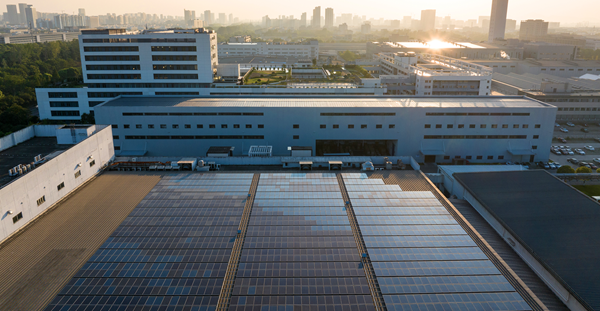Touted as the biggest climate event on Earth, Climate Week NYC is an annual gathering of the leading names in climate action across different sectors. The goal? Celebrate the actions taken so far in addressing climate challenges and broker discussions on how to accelerate the transition.
As the race against time to halve carbon emissions by 2030 continues, Climate Week NYC 2022 focused on getting it done to highlight the importance of tackling the issues of urgency, accountability and climate justice. We spoke with our Chief Sustainability Officer, Alexis Haass, to find out what we can learn from this important event, and what that means ahead of COP 27.
This year’s Climate Week included about 400 events covering four major themes. How would you describe the overall atmosphere of the event? And how close are we to getting things done?
The feeling of urgency is clear. However, there is a disconnect between what some corporates said on stage vs the things discussed in smaller sessions. The conflicted messages about how far we are on the path to ‘getting it done’ illustrate this disconnect well. During the climate week Hub Live panels, for example, on-stage talks made it look like executing a full business transformation toward a net positive impact is relatively straightforward. However, many companies in group discussions expressed their struggles to obtain transparency in sufficient granularity about the impacts in their supply chain. Even when they manage to do so, they are often not in a position to control decisions that would allow them to reinvent the system.
There is also a disconnect between groups on how they view the demand for sustainable products globally. On the big stage, client demand is on the rise, so there’s a need to create new products. But these demand signals, according to smaller sessions, are getting muddled because we don't see enough connected policy frameworks to ensure corporate action is aligned across the globe. The WBCSD circularity roundtable exemplified this challenge. Beyond the lack of greater government funding to support circularity, there is also a lack of consistent definitions regarding what circularity is. That impedes good product design and funding of true closed-loop material and recycling technologies.
People are not pessimistic about achieving net zero. It’s just that they are now increasingly realizing how the path to do so is neither easy nor obvious. We are still missing key data and solutions to support companies in putting those plans into action.
Given the challenges expressed during the sessions, are companies still willing to further their commitments to climate action?
The commitment is there, but now there is an increased awareness and respect for the fact that being committed is just the first step of a LONG process. Fellow CSOs shared that sustainability is increasingly centered in their strategies, and that their organizations and leaders are supportive of this. However, they admit there is still some internal resistance deeper in their organizations, and their leadership teams are often slow in making big-ticket decisions. Despite having the new policy frameworks such as the IRA to fund and make the business case easy for a transition, many companies mentioned are not yet certain on how to execute on this new windfall. For example, financial firms often commented at NYC Climate week that they don’t yet see a pipeline of sufficient projects that are de-risked enough to invest in, and individual firms admitted in side-sessions that they have not yet been able to digest the new market dynamics nor sorted through the new incentives to know which projects it now newly makes sense to green-light.
Seeing how fast market conditions have changed even in this past year, I hope this will help companies overcome the last of this internal resistance and take a new approach to planning for their own transformation. Ideally, studies like the peer-reviewed Cambridge paper (which proves that the energy transition/market shift will be dramatically faster than any agency, government, or models currently predict) will prompt companies to build their Net Zero and core business model transformation plans as an inevitable, near-term shift, and assemble these plans as a series of shovel-ready projects that can be pulled quickly forward if needed.
In your opinion, what did Climate Week lack? What can we take from it to similar events in the future such as COP27?
Right now, Climate Week is more about awareness building and sign signaling. If we are to aggressively meet the 2030 carbon emission and 2050 net zero targets, then there needs to be a fundamental shift in how Climate Week works. There should be more open and honest presentations on stage. The more vulnerable conversations need to be given more attention instead of being discussed only on the sidelines of main events. As for the ‘in-room’ discussions, they should be empowered to come up with solutions to move barriers that hinder organizations from taking concrete actions.
We should remember that events like Climate Week and COP27 are forums for everyone passionate about climate action to work in solidarity and deliver action on climate change. It’s time to get people to shift formats and gather people around action-oriented meetings to problem solve for the ‘true’ barriers. With that rallying power we can coalesce the corporates in attendance to jointly lobby for some hard-hitting policy solutions, such as major-funded government worker (re)training programs, and aligned policies on confusing topics like non-financial reporting, circularity, etc. A new ‘price of entry’ should be introduced; right now, companies are flying to Glasgow, New York and Sharm El Sheik, because they want to connect, but as it stands, it’s now too easy to fly in, present your talking points, and head home. If this existed, attendees would be structurally set up to jointly produce concrete outcomes and advancement, and thus - I expect – finally drive results that would be worthy of the cost in carbon of attending such events.






